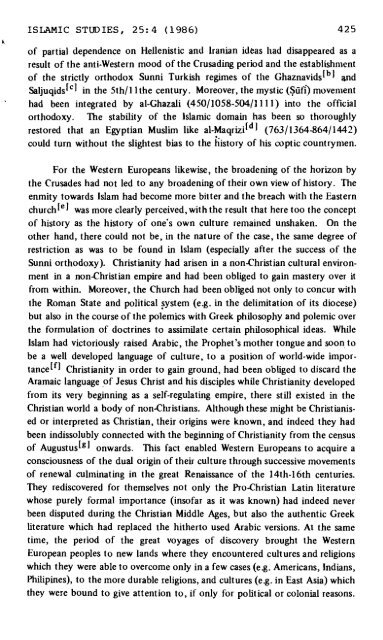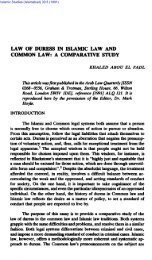ISLAMIC & WESTERN HISTORIOGRAPHY
ISLAMIC & WESTERN HISTORIOGRAPHY
ISLAMIC & WESTERN HISTORIOGRAPHY
You also want an ePaper? Increase the reach of your titles
YUMPU automatically turns print PDFs into web optimized ePapers that Google loves.
,<br />
<strong>ISLAMIC</strong> STUDIES, 25: 4 (1986) 4 2 5<br />
of partial dependence on Hellenistic and lranian ideas had disappeared as a<br />
result of the anti-Western mood of the Crusading period and the establishment<br />
of the strictly orthodox Sunni Turkish regimes of the ~haznavidsl~l and<br />
~aljuqids~~l in the 5th/l lthe century. Moreover, the mystic (Sdli) movement<br />
had been integrated by al-Ghazali (450/1058-504./1111) into the official<br />
orthodoxy. The stability of the Islamic domain has been so thoroughly<br />
restored that an Egyptian Muslim like al-~aqrizi[~ (76311364-8641 1442)<br />
could turn without the slightest bias to the history of his coptic countrymen.<br />
For the Western Europeans likewise, the broadening of the horizon by<br />
the Crusades had not led to any broadening of their own view of history. The<br />
enmity towards Islam had become more bitter and the breach with the Eastern<br />
churchIel was more clearly perceived, with the result that here too the concept<br />
of history as the history of one's own culture remained unshaken. On the<br />
other hand, there could not be, in the nature of the case, the same degree of<br />
restriction as was to be found in lslam (especially after the success of the<br />
Sunni orthodoxy). Christianity had arisen in a nonChristian cultural environment<br />
in a nonthristian empire and had been obliged to gain mastery over it<br />
frorn within. Moreover, the Church had been obliged not only to concur with<br />
the Roman State and political system (eg. in the delimitation of its diocese)<br />
but also in the course of the polemics with Greek philosophy and polemic over<br />
the formulation of doctrines to assimilate certain philosophical ideas. While<br />
lslam had victoriously raised Arabic, the Prophet's mother tongue and soon to<br />
be a well developed language of culture, to a position of world-wide importanceifl<br />
Christianity in order to gain ground, had been obliged to discard the<br />
Aramaic language of Jesus Christ and his disciples while Christianity developed<br />
from its very beginning as a self-regulating empire, there still existed in the<br />
Christian world a body of nonChristians. Although these might be Christianised<br />
or interpreted as Christian, their origins were known, and indeed they had<br />
been indissolubly connected with the beginning of Christianity frorn the census<br />
of ~u~ustus[~l onwards. This fact enabled Western Europeans to acquire a<br />
consciousness of the dual origin of their culture through successive movements<br />
of renewal culminating in the great Renaissance of the 14th-16th centuries.<br />
They rediscovered for themselves not only the ProChristian Latin literature<br />
whose purely formal importance (insofar as it was known) had indeed never<br />
been disputed during the Christian Middle Ages, but also the authentic Greek<br />
literature which had replaced the hitherto used Arabic versions. At the same<br />
time, the period of the great voyages of discovery brought the Western<br />
European peoples to new lands where they encountered cultures and religions<br />
which they were able to overcome only in a few cases (eg. Americans, Indians,<br />
Philipines), to the more durable religions, and cultures (eg. in East Asia) which<br />
they were bound to give attention to, if only for political or colonial reasons.
















